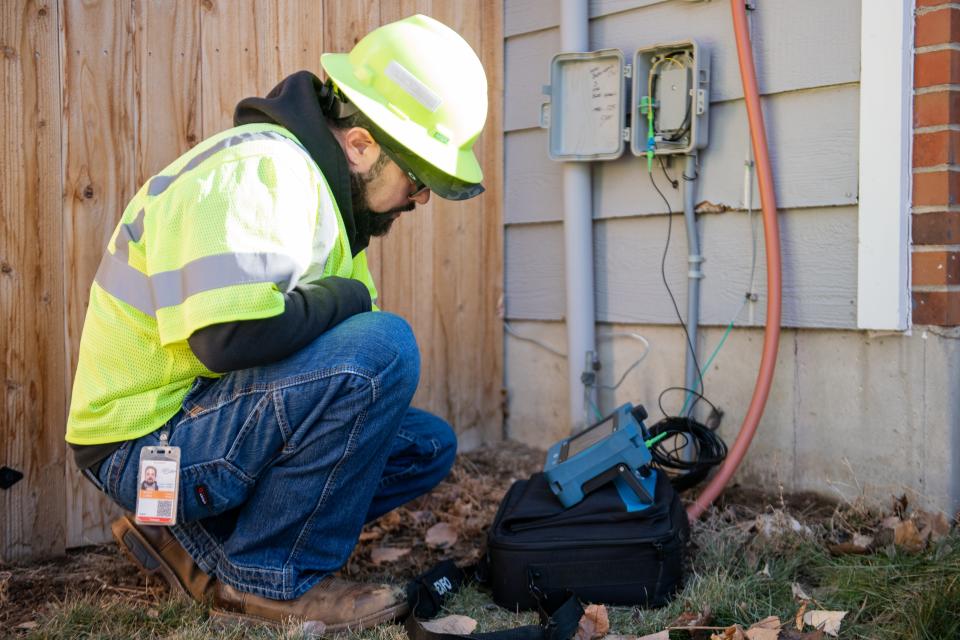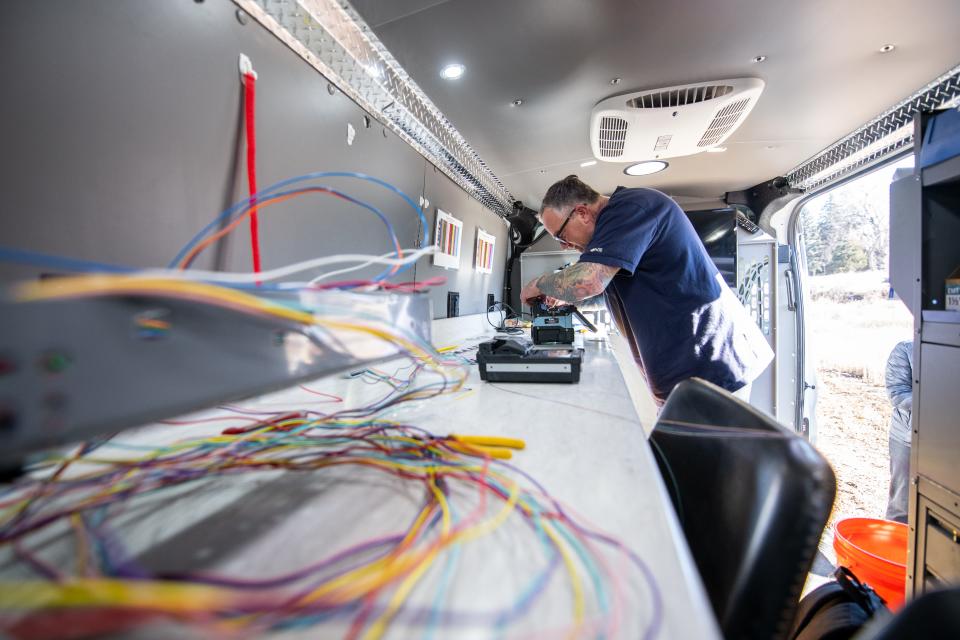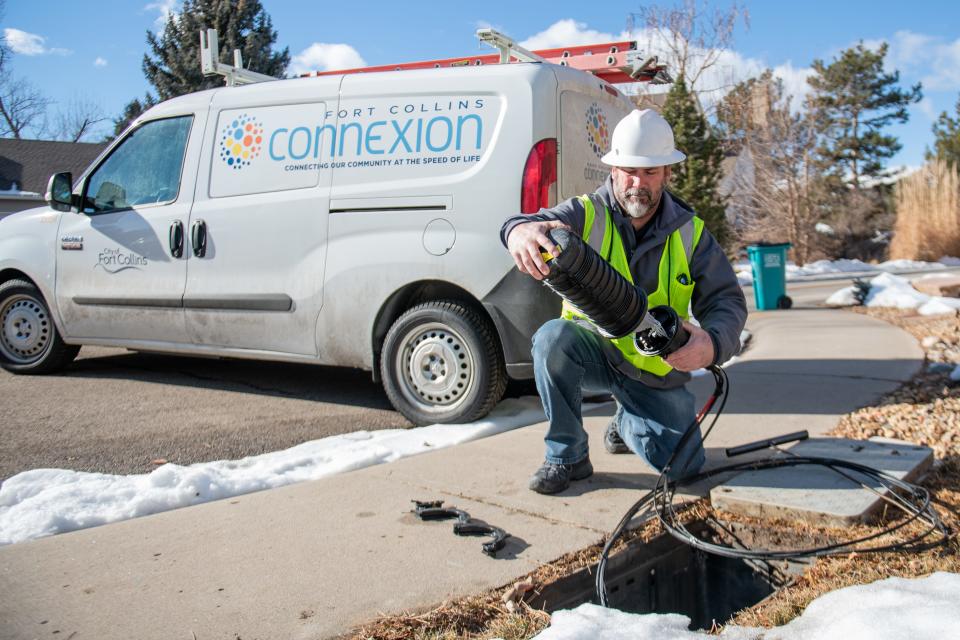Connexion, Fort Collins' city-provided high-speed internet service, is entering Year 7
With its initial buildout finally marked complete in 2023, city of Fort Collins-owned broadband internet provider Connexion is moving into a new phase.
It's been just over six years since voters gave the city the go-ahead to establish broadband service, and after getting behind schedule and going over budget during the construction phase, revenues and customer numbers continue ramping up.
Last month, the Coloradoan sat down with Connexion leadership — Chad Crager, executive director of Connexion; Jeff Rochford, financial planning and analysis manager; and Jill Marx, lead communications specialist — to get an update for the start of Year 7.
Thirty-seven percent of households with access to Connexion have signed up for it, exceeding the city's initial 28% goal. There are 17,000 customers, including 400 commercial customers.
Revenues continue to climb and are up 40% year over year.

But getting to this point has taken longer and cost more money than expected.
The city expected to spend $109 million and see initial buildout done by the end of 2022. Instead, the city has spent $157 million and didn't finish initial buildout until the second half of 2023.
The delays and higher costs were attributed to the COVID-19 pandemic, harsher weather, labor and equipment shortages, and an underestimation of what it would cost to install fiber and how many homes there are.
Now, after three infusions of additional money in three years — $8.2 million in contingency funds from unappropriated bond revenues in 2021, a $20 million loan from Light & Power reserves in 2022 and up to $20 million in bonds in 2023 — Connexion's priority in 2024 is getting service to all the multidwelling buildings that are asking for it.
While the utility is focused on adding more customers and revenue in Fort Collins, it's also helping to bring high-speed internet to underserved areas.
It has started to offer 2-gig internet in addition to the standard 1-gig. And it has increased marketing and engagement efforts and added staff to meet the demand already there.
Who's still waiting for Connexion?
Most residents of multidwelling units, also known as MDUs, don't have access to Connexion right now.
In those cases, building management, rather than residents, must initiate service.
So initial build-out of Connexion didn't include these MDUs, which are apartment buildings or condos that have more than four units.
Once building managers initiate with Connexion, then construction crews come out to lay the fiber: That's the process where sidewalks are marked with spray paint and boring equipment is brought in.

As of December, around 165 MDUs were in process, and the wait is currently six to eight months.
That compares with a wait of two weeks for other residential customers living where Connexion has already been built out.
MDUs make up more than 40% of residences in Fort Collins, Marx said, and Connexion has built out 28% of them so far.
Because new MDUs are always being built, the expansion of Connexion will continue, meaning it will likely always be doing new buildouts, Crager said.
Connexion has a sales representative dedicated to reaching out to MDUs see if they're interested in getting service to their buildings, Marx said. Sometimes, tenants who reach out to Connexion help it start a conversation with the property managers.
Connexion to bring broadband to rural areas
In addition to the MDUs, Connexion will need to build out its infrastructure as areas of Fort Collins' growth management area come into city limits.
But it has also received money through partnerships and grants to connect parts of unincorporated Larimer County to broadband.
Last year, Connexion and Larimer County made a deal to get 1,000 homes in the area of Harmony and Taft Hill roads connected to broadband. The county will pay $3.58 million for design and construction, and Connexion will share revenues from the area with the county.
This month, Connexion was granted $10.8 million in funding from four grants from the U.S. Treasury’s Capital Projects Fund (CPF) program to provide service in Poudre Park, Red Feather Lakes, Rist Canyon and from Rustic to Colorado State University's Mountain Campus.
From 1 gig to 2 gigs and beyond
Connexion's reinvestments in its system allow customers to increase their speeds without the need for more boring or pulling of fiber, Crager said.
In fact, customers can now get up to 10 gigs, Crager said, without the need for further construction.

In 2024, Connexion is working to increase the number of customers who participate in its digital inclusion program, which offers 1 gig at $20 per month for those who qualify. Right now, there are about 450 households in the program, and they disproportionately live in MDUs, a major focus area for Connexion now.
The money for the program comes from payment in lieu of taxes from Connexion to the city's general fund. Six percent of Connexion revenues go into a fund used to pay for that program and for digital literacy. As revenues grow, the fund grows.
"We believe digital inclusion is the right thing to do and sets us apart from the competition," Marx said. "It affirms our mission as an organization to give quality internet to the whole community."
The great thing about Connexion is that it recognizes internet provision as a basic human right, Rochford said, and the city has purposely offered the same service, not a lesser service, for a lower price.
"Only municipalities can truly make good on that promise, and it’s the best thing we do," he said.
In 2024, no price increases are expected for any of its internet customers, Rochford said.
Being in a competitive environment means Connexion has to work to get customers, but Crager said once they do, it’s not hard to show the value of the product: The churn rate is less than 1%.
It's "weird and wonderful" that Connexion can provide internet to customers who "don't just put up with us," he said.
When will Connexion revenues cover its costs?
Connexion expects its revenues to fully cover its costs by 2026. Until then, it'll be a mix of revenues and capital money supporting the enterprise, Rochford said.
The debt is scheduled be paid off in 2042.
Connexion has had its critics since the beginning, and some have continued to be vocal about it.
Eric Sutherland, a Fort Collins resident and longtime Connexion critic, spoke during a recent City Council meeting and described the endeavor as "the largest public policy failure in Colorado municipal history" and claimed the city has no chance of paying the interest on the debt.
But Crager and Rochford said those concerns are unfounded. Based on revenue and customers, Connexion expects to fully pay the bonds and become a revenue stream for the city.
Revenues expected by an updated financial model are on track, if not trending a little higher, Crager said.
For now, Connexion will use revenues and draw money from Light & Power reserves to pay off the bonds.
The city makes bond payments semiannually, and it pays both principal and interest.
Revenues are expected to increase and stabilize in the next four years, and Connexion will keep paying its bond installments and pay back the Light & Power loan.
Staff project Connexion will be in the black and have excess cash beyond what it needs to pay back bonds and the Light & Power loan around 2031.
How Connexion compares with its original business plan
Fort Collins voters in November 2017 approved allowing the city to pursue offering broadband internet service and issuing up to $150 million in bonds to do so.
Prior to that vote, a 2017 business plan explored the idea of Connexion. That plan laid out a timeline, expenses and what was needed to make it financially viable.
Here are the projections, and what has happened:
Expected to issue $130 to $150 million in bonds. Ultimately issued $150 million, and Connexion has also borrowed $20 million from the Light & Power Fund in addition to getting $8.2 million is contingency funding from previously unappropriated bond revenues in 2021.
Expected to spend $109 million during first five years, including buildout. Instead spent $157 million, and it took another year to complete buildout.
Expected $15 million in revenue in Year 5. Revenue at the end of Year 5 was $11.8 million. Revenue as of the most recent report, in July 2023, was $8.59 million, but that reflects only a partial year.
Expected to begin construction in 2018, with a five-year rollout. Later plans estimated the city would finish buildout in 2021. Construction began in late 2018, with initial build-out complete in the second half of 2023.
Projected a desired 28% residential take rate and 45% commercial take rate. Today, Connexion has a 37% residential take rate. Connexion did not reveal its commercial take rate.
Expected 18,000 residential customers in Year 5, with 3,700 commercial customers. In 2023, at the end of Year 6, there were about 17,000 residential customers and around 500 commercial customers. Marx said Connexion adds about one commercial customer daily.
Estimated price of $70 per month for 1-gigabit service and $50 a month for 50-megabits service. Currently charges $70 for 1 gig and doesn't offer slower speeds.
Connexion by the numbers
Take rate of 37%
Around 17,000 customers
Churn rate of less than 1%
About 1,500 TV customers
Spent so far: $157 million
Bonds issued: $150 million
Bond payoff date: 2042
Editor's note: This story has a correction. The $8.2 million Connexion was allocated in 2021 was contingency funding from previously unappropriated bond revenue.
This article originally appeared on Fort Collins Coloradoan: Fort Collins' Connexion internet is 6 years in: Here's how it's doing

